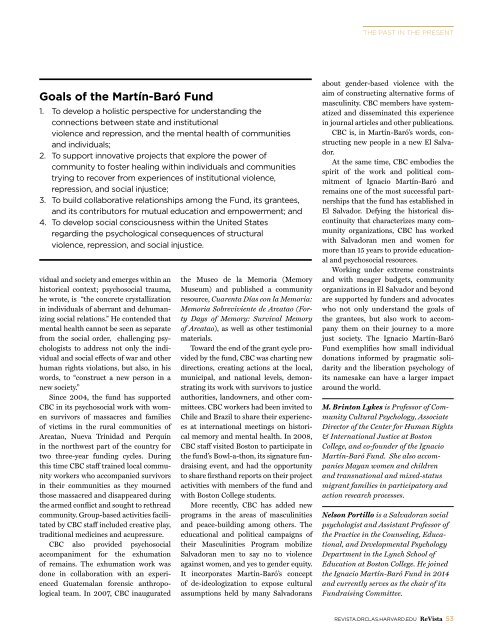EL SALVADOR
8clowSgZh
8clowSgZh
Create successful ePaper yourself
Turn your PDF publications into a flip-book with our unique Google optimized e-Paper software.
THE PAST IN THE PRESENT<br />
Goals of the Martín-Baró Fund<br />
1. To develop a holistic perspective for understanding the<br />
connections between state and institutional<br />
violence and repression, and the mental health of communities<br />
and individuals;<br />
2. To support innovative projects that explore the power of<br />
community to foster healing within individuals and communities<br />
trying to recover from experiences of institutional violence,<br />
repression, and social injustice;<br />
3. To build collaborative relationships among the Fund, its grantees,<br />
and its contributors for mutual education and empowerment; and<br />
4. To develop social consciousness within the United States<br />
regarding the psychological consequences of structural<br />
violence, repression, and social injustice.<br />
vidual and society and emerges within an<br />
historical context; psychosocial trauma,<br />
he wrote, is “the concrete crystallization<br />
in individuals of aberrant and dehumanizing<br />
social relations.” He contended that<br />
mental health cannot be seen as separate<br />
from the social order, challenging psychologists<br />
to address not only the individual<br />
and social effects of war and other<br />
human rights violations, but also, in his<br />
words, to “construct a new person in a<br />
new society.”<br />
Since 2004, the fund has supported<br />
CBC in its psychosocial work with women<br />
survivors of massacres and families<br />
of victims in the rural communities of<br />
Arcatao, Nueva Trinidad and Perquín<br />
in the northwest part of the country for<br />
two three-year funding cycles. During<br />
this time CBC staff trained local community<br />
workers who accompanied survivors<br />
in their communities as they mourned<br />
those massacred and disappeared during<br />
the armed conflict and sought to rethread<br />
community. Group-based activities facilitated<br />
by CBC staff included creative play,<br />
traditional medicines and acupressure.<br />
CBC also provided psychosocial<br />
accompaniment for the exhumation<br />
of remains. The exhumation work was<br />
done in collaboration with an experienced<br />
Guatemalan forensic anthropological<br />
team. In 2007, CBC inaugurated<br />
the Museo de la Memoria (Memory<br />
Museum) and published a community<br />
resource, Cuarenta Días con la Memoria:<br />
Memoria Sobreviviente de Arcatao (Forty<br />
Days of Memory: Survival Memory<br />
of Arcatao), as well as other testimonial<br />
materials.<br />
Toward the end of the grant cycle provided<br />
by the fund, CBC was charting new<br />
directions, creating actions at the local,<br />
municipal, and national levels, demonstrating<br />
its work with survivors to justice<br />
authorities, landowners, and other committees.<br />
CBC workers had been invited to<br />
Chile and Brazil to share their experiences<br />
at international meetings on historical<br />
memory and mental health. In 2008,<br />
CBC staff visited Boston to participate in<br />
the fund’s Bowl-a-thon, its signature fundraising<br />
event, and had the opportunity<br />
to share firsthand reports on their project<br />
activities with members of the fund and<br />
with Boston College students.<br />
More recently, CBC has added new<br />
programs in the areas of masculinities<br />
and peace-building among others. The<br />
educational and political campaigns of<br />
their Masculinities Program mobilize<br />
Salvadoran men to say no to violence<br />
against women, and yes to gender equity.<br />
It incorporates Martín-Baró’s concept<br />
of de-ideologization to expose cultural<br />
assumptions held by many Salvadorans<br />
about gender-based violence with the<br />
aim of constructing alternative forms of<br />
masculinity. CBC members have systematized<br />
and disseminated this experience<br />
in journal articles and other publications.<br />
CBC is, in Martín-Baró’s words, constructing<br />
new people in a new El Salvador.<br />
At the same time, CBC embodies the<br />
spirit of the work and political commitment<br />
of Ignacio Martín-Baró and<br />
remains one of the most successful partnerships<br />
that the fund has established in<br />
El Salvador. Defying the historical discontinuity<br />
that characterizes many community<br />
organizations, CBC has worked<br />
with Salvadoran men and women for<br />
more than 15 years to provide educational<br />
and psychosocial resources.<br />
Working under extreme constraints<br />
and with meager budgets, community<br />
organizations in El Salvador and beyond<br />
are supported by funders and advocates<br />
who not only understand the goals of<br />
the grantees, but also work to accompany<br />
them on their journey to a more<br />
just society. The Ignacio Martín-Baró<br />
Fund exemplifies how small individual<br />
donations informed by pragmatic solidarity<br />
and the liberation psychology of<br />
its namesake can have a larger impact<br />
around the world.<br />
M. Brinton Lykes is Professor of Community<br />
Cultural Psychology, Associate<br />
Director of the Center for Human Rights<br />
& International Justice at Boston<br />
College, and co-founder of the Ignacio<br />
Martín-Baró Fund. She also accompanies<br />
Mayan women and children<br />
and transnational and mixed-status<br />
migrant families in participatory and<br />
action research processes.<br />
Nelson Portillo is a Salvadoran social<br />
psychologist and Assistant Professor of<br />
the Practice in the Counseling, Educational,<br />
and Developmental Psychology<br />
Department in the Lynch School of<br />
Education at Boston College. He joined<br />
the Ignacio Martín-Baró Fund in 2014<br />
and currently serves as the chair of its<br />
Fundraising Committee.<br />
REVISTA.DRCLAS.HARVARD.EDU ReVista 53


